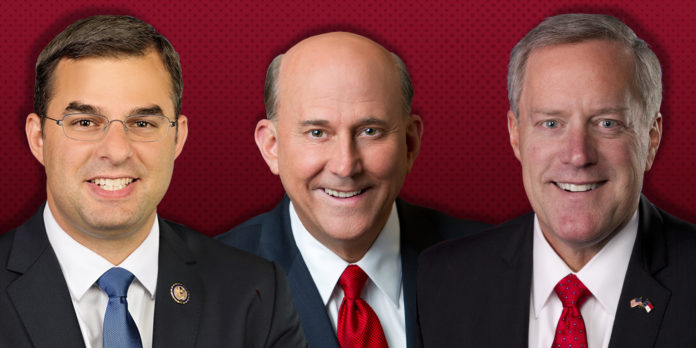
The defiant actions of the House Freedom Caucus have frustrated President Donald Trump so much during his first 100 days in agency that he has already vowed to fight them in the 2018 midterm elections. The small and unruly band of far-right reactionaries, who have been branded un-American and rejected as radicals by the media, leverage a powerful point within Congress.They represent a serious challenge to establishment Republicanism and the Trump administration, but who are the House Freedom Caucus members and, perhaps more importantly, what do they crave?
10 things to know about the House Freedom Caucus
1) The House Freedom Caucus has roots in the Tea Party revolution of 2010
Of the publicly corroborated representatives from the Caucus, many are religious reactionaries and right-leaning libertarians who were elected by the Tea Party wave. It was merely in mid-January 2015, nonetheless, at a Republican party congressional meeting that its nine founding members decided to establish a separate congressional caucus entity. They align with many Tea Party policy posts, such as a full repeal of the Affordable Care Act( more on that afterward ).
2) Members are predominately white and male
Although the Caucus does not disclose the name of our own member, and fulfills ever take place in private, the members we do know of are predominantly white and male. As of March 2017, it is believed that there are 36 Caucus members, all serving in the House of Representatives, and they are from are from all over the two countries. Membership is by invitation only.
Pew Research Center has done some of the most significant reporting on the group. Here’s Pew’s chart of the House Freedom Caucus members 😛 TAGEND
3) House Freedom Caucus members are considered young, upstart reactionaries
Despite having an average age of 54, the known members are considered young politicians, both in terms of experience and age. None of the members hold senior roles in their party or the government, but that doesnt dull their uncompromising commitment to fundamental conservative ideals over party politics.
4) Caucus members have a higher level of educational achievement than their GOP colleagues
These reactionaries are among some of the brightest. Overall, Caucus members are twiceas likely to have doctoral degrees than other Republicans and three times more likely to have a medical or dental degree. Theyve attended better universities, too, with 25 percent of Caucus members having attended the countrys prestigious top-5 0 ranking universitiescompared with only 12 percent of other party Republicans.
5) Nearly half of Americans say they have never heard of the House Freedom Caucus
In a recent surveypublished by the Pew Research Center, 42 percent of all participants said that they had heard nothing at all about the Caucus or what it stood for. Although the Caucus did make headlines for its major role in blocking Trumps healthcare reform effort, simply 19 percent of those taking part in the survey could say that theyd heard a lot about the group.
6) The name House Freedom Caucus was picked because it was birthing
Even amongst Caucus members, different groups appetite for debate and notorious nitpicking on policy is clearly joked about. Founding member Mick Mulvaney is quoted as saying the name was selected because it was so generic and universally dreadful that we had no reason to be against it.
7) The blocrepresent simply 8 percent of House representatives
This one is just simple math. There are 247 Republican seats within the House, compared to only 188 Democrat. This safe majority allows the party to control many of government decisions about appointments and bills that pass their lane. Of that majority, roughly three dozen are Caucus members, who choose to vote as a bloc on any decision irrespective of party point. If Caucus members imperfection against the wider Republican vote on a committed issue, the partys majority is cut to, at best, 211 seatsprovided that other House Republicans dont abstain or also flip. As such, though they’re a small group, the House Freedom Caucus has the ability to upset major decisions.
8) The House Freedom Caucus was instrumental in unseating former Speaker of the House John Boehner in 2015
A central criterion for to intervene in the House Freedom Caucus when it was established in January 2015 was presenting opposition to Boehner, and in the first big test of its affect, the Caucus forced his abdication in a stand-off rooted in pro-life values and ideology.
Rep. Mick Mulvaney( R-SC ), a founding member of the Caucus who serves the same South Carolina district as fictional House of Cards character Frank Underwood, presented a letter to Congress in September 2015 committing to blocking funding for Planned Parenthood. The organization trafficked dead-baby parts, he claimed, and threatened to block any Obama administration budget proposal until House Republicans stood by the social-conservative and pro-life ideals they gushed to the electorate.
With a potential government shutdown, Boehner eventually resigned. The instant was a defining oneand underlined not only a new power struggle within the Republican party but the ideological accountability the Caucus wished to and could enforce.
9) The House Freedom Caucus has already gone head-to-head with Trump and forced him to withdraw the American Healthcare Act
In recent developments upset to the establishment, the Caucus threatened to vote down Trumps attempt at healthcare reform since they are didnt believe it went far enough in dismantling the Affordable Care Act( ACA ), known also as Obamacare.
Caucus members met with the president to discuss possible compromise the changes to the ACA that would buy their support in an imminent House vote, most significantly the exclusion of a key ACA provision known as Essential Health Benefitswhich covered the likes of emergency rooms visits, maternity care, prescription drugs, and pediatric services.
Unable to come to an agreement, Trump receded the bill over fears that it would not pass. This incident, brought about again by an ideological sentence, was a major shame for the president, who campaigned heavily on healthcare reform.
10) Trump has vowed to fight the House Freedom Caucus in the mid-terms
Having frustrated the president over healthcare, the Caucus has been dragged into a campaign of words with the current administration. After the ACA repeal fell through, Trump took to Twitter to call out the Caucus for hurting the Republican agenda.
The Freedom Caucus will hurt the entire Republican agenda if they don’t get on the team,& fast. We must fight them,& Dems, in 2018!
— Donald J. Trump (@ realDonaldTrump) March 30, 2017
Trump even called out individual members:
If @RepMarkMeadows, @Jim_Jordan and @Raul_Labrador would get on board we would have both great healthcare and massive tax cuts& reform.
— Donald J. Trump (@ realDonaldTrump) March 30, 2017
The Caucus Rep. Justin Amash( R-Mi) struck back and accused Trump of bowing to theestablishment.
It didn’t take long for the swamp to drain @realDonaldTrump. No shame, Mr. President. Almost everyone succumbs to the D.C. Establishment. https :// t.co/ 9bDo8yzH7I
— Justin Amash (@ justinamash) March 30, 2017
Thats when Trumps White House Director of Social Media Dan Scavino advised the #TrumpTrain to defeat Amash in primaries and called him a liability.
. @realDonaldTrump is bringing auto flowers& jobs back to Michigan. @justinamash is a big liability. #TrumpTrain, overcame him in primary.
— Dan Scavino Jr. (@ DanScavino) April 1, 2017
The bout, nonetheless knee-jerk, is unlikely to do the president any favors. The profile and muscle of the House Freedom Caucus are merely rising. At worst the Caucus could choose to nit-pick the insufficiency of every policy effort, hitting the brakes in a way that could deflate the credibility of “the mens” who journeyed to presidential succes criticizing the pandering and ineffective establishment.
Read more here: http :// www.dailydot.com /~ ATAGEND








